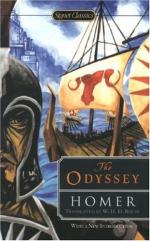And the goddess, grey-eyed Athene, answered him, saying: ’O father, our father Cronides, throned in the highest; that man assuredly lies in a death that is his due; so perish likewise all who work such deeds! But my heart is rent for wise Odysseus, the hapless one, who far from his friends this long while suffereth affliction in a sea-girt isle, where is the navel of the sea, a woodland isle, and therein a goddess hath her habitation, the daughter of the wizard Atlas, who knows the depths of every sea, and himself upholds the tall pillars which keep earth and sky asunder. His daughter it is that holds the hapless man in sorrow: and ever with soft and guileful tales she is wooing him to forgetfulness of Ithaca. But Odysseus yearning to see if it were but the smoke leap upwards from his own land, hath a desire to die. As for thee, thine heart regardeth it not at all, Olympian! What! Did not Odysseus by the ships of the Argives make thee free offering of sacrifice in the wide Trojan land? Wherefore wast thou then so wroth with him, O Zeus?’
The “Odyssey” (as every one knows) abounds in passages borrowed from the “Iliad”; I had wished to print these in a slightly different type, with marginal references to the “Iliad,” and had marked them to this end in my Ms. I found, however, that the translation would be thus hopelessly scholasticised, and abandoned my intention. I would nevertheless urge on those who have the management of our University presses, that they would render a great service to students if they would publish a Greek text of the “Odyssey” with the Iliadic passages printed in a different type, and with marginal references. I have given the British Museum a copy of the “Odyssey” with the Iliadic passages underlined and referred to in Ms.; I have also given an “Iliad” marked with all the Odyssean passages, and their references; but copies of both the “Iliad” and “Odyssey” so marked ought to be within easy reach of all students.
Any one who at the present day discusses the questions that have arisen round the “Iliad” since Wolf’s time, without keeping it well before his reader’s mind that the “Odyssey” was demonstrably written from one single neighbourhood, and hence (even though nothing else pointed to this conclusion) presumably by one person only—that it was written certainly before 750, and in all probability before 1000 B.C.—that the writer of this very early poem was demonstrably familiar with the “Iliad” as we now have it, borrowing as freely from those books whose genuineness has been most impugned, as from those which are admitted to




